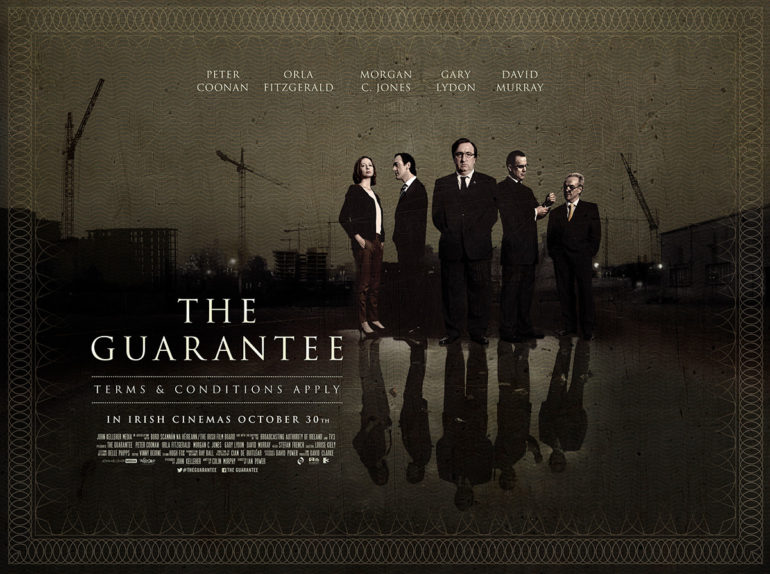On the night of September 29th, 2008, the Irish government took a drastic financial gamble, guaranteeing retail and corporate deposits, interbank deposits, senior unsecured debt, asset covered securities, and dated subordinated debt at the 6 biggest banks in the country. This act was the first government action in what the Central Bank Governor, Patrick Honohan would later describe as “one of the most expensive banking crises in world history”. Every person living then and now in Ireland was affected by this crisis and by the events of this night, that would lead to the government, the Central Bank, and later the ECB to ECB and the Irish Central Bank to provide over €150 billion in funding for the six banks. The Guarantee attempts to dramatise the events leading up to the infamous night, via a fictional narrative involving some very factual parties.
That this is an important story worthy of examination cannot be denied, and basing the film dramatisation of the event on a successful and well regarded stage-play is a logical move. Colin Murphy adapts his own play Guaranteed!, expanding the narrative to allow for the change in medium, but the film never quite escapes its stage origin. In an effort to make the script more cinematic text is overlaid on dialogue sequences, and internal monologues are given a visual aesthetic. Scenes from real news reports, primarily from sponsors TV3, are intercut to add historical context. What this accomplishes is an informational overload and a narrative disconnect from the events on screen. Financial terms are bandied around with no regard as to audience familiarity with such combinations of buzzwords, while characters are introduced with no background or context. The first sentence of this review includes a phrase taken directly from the film and the government press release on the guarantee, but if it seems gibberish to you then chances are so will much of the dialogue and on-screen text in this film. The music too serves to undercut or over-egg the tension that should naturally build as the film progresses. The film’s origins as a made-for-TV affair, with a limited budget, are obvious throughout as sound-stages double for Anglo Irish BankHQ and Government Buildings, giving an unreal feel to all locations. There’s even one scene that where the camera is set at an angle to highlight the lack of ceiling in the room. What all of this means is that it is left in the hands of the actors to carry the film.
For the most part the acting on display is fine. Before shooting a conscious decision was taken that none of the actors would impersonate the real-life people that they were portraying. An interesting approach, but one that manages to disconnect the audience from these very real figures that are well-known to the Irish populace. The caveat to that is that there are legal cases pending against some of these figures, so the decision was not entirely in the hands of the filmmakers. The standout performance here is David Murray as the late Minister for Finance Brian Lenihan. His is the best written part and Murray manages to convincingly portray a man lost-at-sea in a the maelstrom of events taking place around him. The decision, carried over from the play, to have Peter Coonan play both Anglo Irish Bank chief executive David Drumm and a member of the Central Bank of Ireland was badly misjudged. Coonan underwhelms in both roles, and his presence as the two just compounds the confusion coming from the staging. Orla Fitzgerald is good as the token female in the group, the only one with any kind of credible grasp on the magnitude of events. Her presence here seems an obvious indictment of the lack of women in Irish politics, Irish industry, and film in general. Elsewhere Gary Lydon as Taoiseach Brian Cowen and Morgan C Jones as Anglo Irish chairman Sean Fitzpatrick are underserved by the script.
The Guarantee should be an important movie as it depicts a very important event in Irish history. Instead it is a missed opportunity, a poor and underwhelming depiction that lacks a real punch. The cast and crew have done better things in the past and will do better things in the future. Perhaps at that point, when we are further away from these events, audiences will get the film they deserve.

